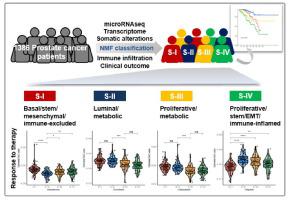当前位置:
X-MOL 学术
›
Comput. Struct. Biotechnol. J.
›
论文详情
Our official English website, www.x-mol.net, welcomes your
feedback! (Note: you will need to create a separate account there.)
MicroRNA-regulated transcriptome analysis identifies four major subtypes with prognostic and therapeutic implications in prostate cancer
Computational and Structural Biotechnology Journal ( IF 4.4 ) Pub Date : 2021-08-31 , DOI: 10.1016/j.csbj.2021.08.046 Bing-Biao Lin 1 , Han-Qi Lei 1 , Hai-Yun Xiong 1 , Xing Fu 2 , Fu Shi 3 , Xiang-Wei Yang 1 , Ya-Fei Yang 1 , Guo-Long Liao 1 , Yu-Peng Feng 1 , Dong-Gen Jiang 1 , Jun Pang 1
Computational and Structural Biotechnology Journal ( IF 4.4 ) Pub Date : 2021-08-31 , DOI: 10.1016/j.csbj.2021.08.046 Bing-Biao Lin 1 , Han-Qi Lei 1 , Hai-Yun Xiong 1 , Xing Fu 2 , Fu Shi 3 , Xiang-Wei Yang 1 , Ya-Fei Yang 1 , Guo-Long Liao 1 , Yu-Peng Feng 1 , Dong-Gen Jiang 1 , Jun Pang 1
Affiliation

|
MicroRNA (miRNA) deregulation plays a critical role in the heterogeneous development of prostate cancer (PCa) by tuning mRNA levels. Herein, we aimed to characterize the molecular features of PCa by clustering the miRNA-regulated transcriptome with non-negative matrix factorization. Using 478 PCa samples from The Cancer Genome Atlas, four molecular subtypes (S-I, S-II, S-III, and S-IV) were identified and validated in two merged microarray and RNAseq datasets with 656 and 252 samples, respectively. Interestingly, the four subtypes showed distinct clinical and biological features after comprehensive analyses of clinical features, multiomic profiles, immune infiltration, and drug sensitivity. S-I is basal/stem/mesenchymal-like and immune-excluded with marked transforming growth factor , epithelial-mesenchymal transition and hypoxia signals, increased sensitivity to olaparib, and intermediate prognosis. S-II is luminal/metabolism-active and responsive to androgen deprivation therapy with frequent TMPRSS2-ERG fusion and a good prognosis. S-III is characterized by moderate proliferative and metabolic activity, sensitivity to taxane-based chemotherapy, and intermediate prognosis. S-IV is highly proliferative with moderate EMT and stemness, frequent deletions of , and , and the poorest prognosis; it is also immune-inflamed and sensitive to anti-PD-L1 therapy. Overall, based on miRNA-regulated gene profiles, this study identified four distinct PCa subtypes that could improve risk stratification at diagnosis and provide therapeutic guidance.
中文翻译:

MicroRNA 调节的转录组分析确定了对前列腺癌具有预后和治疗意义的四种主要亚型
MicroRNA (miRNA) 失调通过调节 mRNA 水平在前列腺癌 (PCa) 的异质性发展中发挥着关键作用。在此,我们旨在通过非负矩阵分解对 miRNA 调节的转录组进行聚类来表征 PCa 的分子特征。使用来自癌症基因组图谱的 478 个 PCa 样本,在两个合并的微阵列和 RNAseq 数据集中分别有 656 个和 252 个样本鉴定和验证了四种分子亚型(SI、S-II、S-III 和 S-IV)。有趣的是,在对临床特征、多组学特征、免疫浸润和药物敏感性进行综合分析后,这四种亚型表现出不同的临床和生物学特征。 SI 具有基底/干/间质样和免疫排斥性,具有显着的转化生长因子、上皮-间质转化和缺氧信号,对奥拉帕尼的敏感性增加,预后中等。 S-II 具有管腔/代谢活性,对雄激素剥夺疗法有反应,具有频繁的 TMPRSS2-ERG 融合和良好的预后。 S-III 的特点是中等增殖和代谢活性、对基于紫杉烷的化疗敏感以及中等预后。 S-IV 具有高度增殖性,具有中等 EMT 和干性, 、 和 频繁缺失,预后最差;它也是免疫炎症的并且对抗 PD-L1 治疗敏感。总体而言,基于 miRNA 调控的基因图谱,本研究确定了四种不同的 PCa 亚型,可以改善诊断时的风险分层并提供治疗指导。
更新日期:2021-08-31
中文翻译:

MicroRNA 调节的转录组分析确定了对前列腺癌具有预后和治疗意义的四种主要亚型
MicroRNA (miRNA) 失调通过调节 mRNA 水平在前列腺癌 (PCa) 的异质性发展中发挥着关键作用。在此,我们旨在通过非负矩阵分解对 miRNA 调节的转录组进行聚类来表征 PCa 的分子特征。使用来自癌症基因组图谱的 478 个 PCa 样本,在两个合并的微阵列和 RNAseq 数据集中分别有 656 个和 252 个样本鉴定和验证了四种分子亚型(SI、S-II、S-III 和 S-IV)。有趣的是,在对临床特征、多组学特征、免疫浸润和药物敏感性进行综合分析后,这四种亚型表现出不同的临床和生物学特征。 SI 具有基底/干/间质样和免疫排斥性,具有显着的转化生长因子、上皮-间质转化和缺氧信号,对奥拉帕尼的敏感性增加,预后中等。 S-II 具有管腔/代谢活性,对雄激素剥夺疗法有反应,具有频繁的 TMPRSS2-ERG 融合和良好的预后。 S-III 的特点是中等增殖和代谢活性、对基于紫杉烷的化疗敏感以及中等预后。 S-IV 具有高度增殖性,具有中等 EMT 和干性, 、 和 频繁缺失,预后最差;它也是免疫炎症的并且对抗 PD-L1 治疗敏感。总体而言,基于 miRNA 调控的基因图谱,本研究确定了四种不同的 PCa 亚型,可以改善诊断时的风险分层并提供治疗指导。









































 京公网安备 11010802027423号
京公网安备 11010802027423号